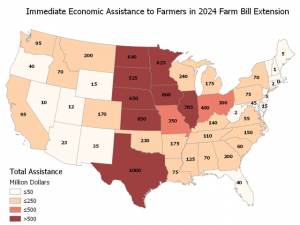
The government would send $2 billion to financially beleaguered farmers almost immediately under a mammoth farm bill proposed by Senate Agriculture chairwoman Debbie Stabenow on Monday — months sooner than the Republican-written bill awaiting a House vote. With only a few weeks left in the congressional session, Republican senators said Stabenow acted too late to enact a new farm bill, already 13 months late.
“I firmly believe it is the best and probably only path to pass a five-year farm bill this year,” said Stabenow in an appeal for bipartisan support of her 1,397-page bill. “It puts more farm in the farm bill for all of our commodities, not at the expense though of rural communities or American families that are critical to holding the farm bill coalition together.”
Arkansas Sen. John Boozman, the Republican in line to become Agriculture Committee chairman in January when Republicans take control of the Senate, said “an 11th-hour partisan proposal…is insulting. America’s farmers deserve better.”
Stabenow would increase farm bill spending by $39 billion over 10 years, including $20 billion for crop subsidy, crop insurance, specialty crop, and trade promotion programs, $8.5 billion for public nutrition programs, and $4.3 billion for rural development. To get money to producers quickly, the bill would reimburse immediately an estimated $2 billion in crop insurance premiums paid by farmers. The bill also would advance by six months the payment date for crop subsidies, which now are paid a year after harvest.
She rejected Republican proposals to cuts SNAP outlays by $29 billion and to allow climate mitigation funds to be spent on conservation projects that do not reduce greenhouse gas emissions and sequester carbon in the soil.
“I am absolutely not going to put my stamp on the largest cut in SNAP in more than 30 years,” she said, nor would she repudiate the 2022 climate law that directed windfall funding to USDA conservation programs to mitigate global warming.
The farm bill approved by the House Agriculture Committee in May would increase crop subsidy and crop insurance spending by $47 billion, most notably by increasing so-called reference prices, which trigger subsidy payments, by 15 percent. The CBO said the committee bill was $33 billion over budget because it overstated the savings from restricting USDA use of a $30 billion reserve fund. The bill has not been scheduled for a House vote, with persistent questions about if it would pass.
During a briefing, Stabenow said her bill adopted the same funding mechanism as the House, with the inclusion of a declaration that limiting use of the USDA fund created sufficient offsets, in hopes of breaking an impasse over the bill. Instead, “they keep adding new red lines,” she said. In a podcast released over the weekend, House Agriculture chairman Glenn Thompson said, “The Senate Democrats and Sen. Debbie Stabenow [have] not negotiated in good faith.”
The National Farmers Union said House and Senate leaders “must now make passing a strong, comprehensive five-year farm bill their top priority before the year ends.” The American Farm Bureau Federation said time was short but it was committed “to working with elected officials to achieve federal policy that improves the outlook for farmers and ranchers” in the face of lower farm income.
A copy of Stabenow’s bill, printed on letter-size paper, stood more than seven inches tall. “It’s a balance,” she said, describing the many interests in the panoramic legislation. “This is a huge bill.”
Stabenow replied, “Heaven help,” when asked her reaction to President-elect Donald Trump’s selection of Robert Kennedy Jr., who has criticized modern farming methods, to oversee food and health policy. “I’m going to pray a lot,” she said.
A nine-page summary of the Stabenow bill was available here.
The text of the bill was available here.
You can now read the most important #news on #eDairyNews #Whatsapp channels!!!
🇺🇸 eDairy News INGLÊS: https://whatsapp.com/channel/0029VaKsjzGDTkJyIN6hcP1K

























